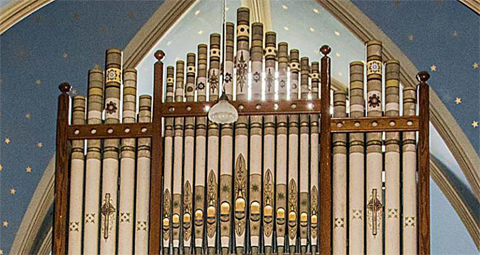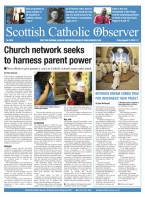July 28 | ![]() 0 COMMENTS
0 COMMENTS ![]() print
print

Organ donation brings new life to Lebanon church
The organ of a remote Highland church is to have a second life – in Lebanon -By Amanda Connelly
The Church of the Incarnation in Tombae has ceased life as an active parish, but its much-loved organ (right) will be dismantled and donated to the Lebanese Evangelical Church, which runs the Johann Ludwig Schneller School for underprivileged youngsters. It will be rebuilt in the school’s chapel, named St Michael’s.
With the permission of Bishop Hugh Gilbert of Aberdeen, the organ has been deconstructed by Gerhard Walcker-Mayer, an organ building company from Germany.
Originally, Aberdeen Diocese had hoped that the organ might be fitted elsewhere within Scotland, but no viable options arose.
Rather than having the organ parts repurposed for other projects, the community preferred that the organ remain intact. It will now make the journey to the town of Khirbet Kanafar in Lebanon, around 50 miles from Damascus, where it will have a bright future in the children’s school.
“We hope your pipe organ will be another addition to our church which we will treasure with great pride,” George Daniel Haddad, the general director of the Johann Ludwig Schneller School and its pastor, wrote in a letter to the Tombae parish priest Fr Colin Stewart.
“Music is a most wonderful tool for building bridges between people from various cultures and religions.
“We teach our children much more through singing hymns than what is said by teachers,” he went on.
“Our children love singing, and they certainly sing much better than many [in] our churches.
“It is our hope not to only use it for church services or chapel at school, but also through the support of our dear friend, Klaus Schulten, to have organ recitals in church to bring music appreciation to our region.
“We want to use music as a tool for peace education and building bridges among people.”
The installation of the organ will also be appreciated by other church groups from across Europe visiting the Middle East, who stay in the school’s guesthouse and use the church for worship. The organ’s Scottish history will not be forgotten, with a commemorative plaque to be fixed, detailing the parish from which it came.
The school has been modernised over the past decade to bring boarding facilities, education and vocational training to some of the area’s poorest children.
It hosts 100 boarding pupils free of charge, and 200 day pupils from the nearby rural areas with many from poor farming backgrounds. 20-50 per cent of these pupils receive financial aid with school fees.
It also educates 35 Syrian children from nearby camps and a number of Palestinian children.
The ecumenical school features pupils and teachers from all faith groups in Lebanon, and does not ‘try to convert people from [one] denomination or faith to another.’
It aims to teach pupils to be peace-loving and tolerant and hosts daily chapel—an ‘integral part of the school.’
Mr Haddad said he hoped the Church of the Incarnation’s pipe organ ‘will be another addition to our church which we will treasure with great pride.’










